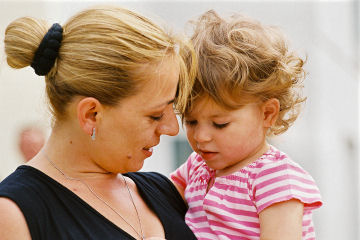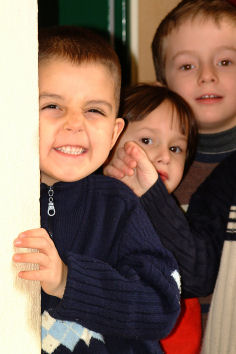Providing support to families in Kosovo
05/02/2007
January 2007 saw SOS Children launch two new family strengthening programmes in Kosovo, located in the vicinity of SOS Children's Village Pristina. The charity focuses its work in the former Yugoslavian Republic on providing support to those families, regardless of their national affiliation, that are eat risk of abandoning their children in this troubled region.
Initially, the programmes will be run in cooperation with the local social authorities and over time SOS Children will work in cooperation with other NGOs. The aims of the programmes are: to build self-reliance and sustainability with the participating families in order to ensure proper protection, upbringing and care for their children; to enable children to grow up in an environment where their needs are met and rights respected; and to build awareness within the community to create a supportive environment for orphaned, abandoned and destitute children.

Reaching out to the poorest
SOS Children in Kosovo currently runs a programme in Matiqan, one of Pristina's poorest communities. The area has only one hospital and one school for a population of 7,000 Kosovo-Albanians. One third of the families in Matiqan rely on social welfare, the unemployment rate is around 80%, and cases of domestic violence, child labour and gender discrimination are increasing. Currently, 33 families caring for a total of 74 children have been identified as eligible beneficiaries. Most are single mothers, but there are also sibling-headed households and families where the parents are terminally ill or have psychological disorders. Some of these families survive on as little as 35 Euros a month in a society where one loaf of bread costs 50 Euro cents.
Despite these difficulties, Fetije, the social worker in charge of the Matiqan programme, is optimistic about the programme's start: "Together with the state social authorities, we are conducting the first family visits and expect to complete the initial assessments at the beginning of February." Specific aid, such as limited financial assistance and donations in kind, will be offered initially. However, the main focus of the programme lies in the development of parental and vocational skills for adults and education provision for children.
Breaking the isolation
The charity’s second programme is located in the village of Gracanica, south of Pristina, where the population is mainly of Serbian nationality. Since the 1999 conflicts, Gracanica’s population of almost 10,000 has led a secluded life behind barbwire fences protected by KFOR troops (NATO forces in Kosovo). Approximately 130 families in Gracanica share the same grim living conditions and children face the same risk of abandonment as their Matiqan contemporaries. The Serbian families also suffer from restrictions of movement and isolation, which deprive them of many public services.

The programme in Gracanica lagged behind as a result of the travelling restrictions and bureaucratic delays. However, through word-of-mouth, the programme has become popular and eagerly-awaited among the needy families. It is expected that the first group of 25 families will be identified in early February. "The programme offers numerous possibilities to improve these people’s situation," says Ana, the social worker in charge of the Gracanica programme. "The isolation and the poverty constantly increase the both the mental and social needs of the families here."
Due to lack of updated official records for the province, SOS Children (in cooperation with the local authorities) will also conduct further investigations into the needs of families at risk in these two locations. It is also planned to include other NGOs in the programmes, which would expand the scope of services to children with special needs, child victims of trafficking and female victims of domestic violence. The programmes are expected to run for at least three years.
SOS Children Kosovo established the first facilities in the province's capital in the winter of 2001. Today in Kosovo, the charity runs one SOS Children's Village with three SOS families, a nursery with a capacity of 120 children, one SOS Social Centre for the short- and middle-term placement of children in need, with a capacity for 24 babies, and one transit home called "Beehive" for children with special needs, which currently provides care for six children. In 1999 SOS Children established an emergency relief programme to help Kosovo refugees in Albania.
Relevant Countries: Albania, Macedonia, Yugoslavia.